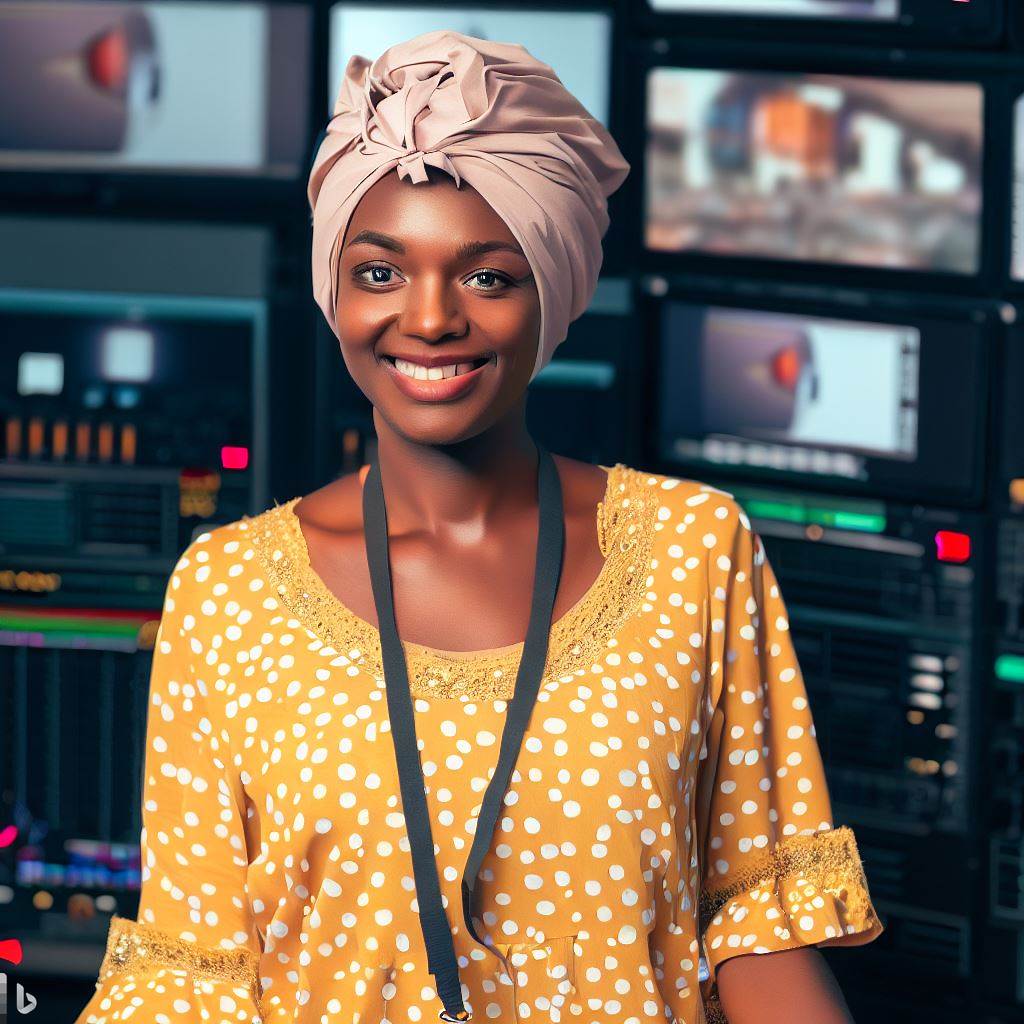Exploring the Role of a Television Editor in Nigeria
Last Updated on January 26, 2024
Introduction
Television editing in Nigeria is a significant aspect of the media industry.
A television editor controls the visual and audio elements of TV content in Nigeria.
This blog post aims to explore the responsibilities and significance of a television editor in Nigeria.
Introduction to Television Editing:
Dive into the world of television editing, a crucial element of media production.
Background on the Role:
- Artistry of Storytelling: Television editors shape narratives, pacing, and emotions to captivate audiences.
- Technical Mastery: Expertise in editing software and techniques enhances visual and auditory coherence.
- Collaborative Process: Editors collaborate with directors, producers, and sound designers to achieve the desired impact.
Purpose of the Blog Post:
This blog seeks to illuminate the art and intricacies of television editing in Nigeria. By understanding the pivotal role these editors play, readers gain insights into the magic that brings televised stories to life.
The Responsibilities of a Television Editor
Main duties and responsibilities of a television editor
- The television editor is responsible for assembling raw footage into a cohesive and captivating story.
- They work closely with the director and producers to fulfill the creative vision of the project.
- They review all the footage and select the best shots to create a seamless narrative.
- Television editors are skilled in using editing software to arrange, trim, and rearrange video clips.
- They add special effects, transitions, and sound effects to enhance the visual and auditory experience.
- The editor collaborates with the sound department to ensure proper synchronization of audio and video.
- They work on multiple versions of the same production, such as different cuts for TV, online, or international markets.
- Television editors focus on maintaining continuity and smooth flow between scenes and sequences.
- They make sure the pacing of the show is engaging and effectively conveys the intended emotions.
- Editors also play a crucial role in color correction and grading to enhance the visual aesthetics of the content.
Importance of their role in the production process
Television editors play a vital role in the production process as they shape the final product that reaches the audience.
- They have the power to influence the narrative and impact how the story is perceived.
- By carefully selecting shots and arranging them in a logical order, they create a compelling and engaging story.
- The television editor’s expertise in pacing and rhythm contributes to the overall entertainment value of the show.
- Their ability to enhance the visual and auditory aspects elevates the quality of the production.
- Television editors ensure that the story flows smoothly, eliminating any inconsistencies or distractions.
- Their collaboration with the sound department enhances the immersive experience for the viewers.
- The editor’s attention to detail helps maintain the integrity of the production, ensuring it aligns with the desired objectives.
- Their contribution significantly affects the reception of the show by the audience, making their role indispensable.
Specific challenges faced by television editors in Nigeria
Television editors in Nigeria encounter several unique challenges in their profession.
- Limited access to advanced editing software and equipment hampers their ability to produce high-quality content.
- Tight deadlines and pressure to meet broadcast schedules can compromise the creative process.
- Insufficient communication and coordination among production teams can lead to inconsistent editing decisions.
- Lack of formal training opportunities and mentorship programs restricts professional growth for television editors.
- Limited budgets often result in inadequate resources and the inability to hire a proficient editing team.
- The influence of external factors, such as censorship and cultural expectations, can restrict creative freedom.
- Television editors in Nigeria also face challenges related to copyright infringement and piracy.
- Inconsistent power supply and technical difficulties can hinder their workflow and editing efficiency.
- The constantly evolving technology and industry trends require television editors to stay updated and adapt quickly.
Basically, television editors in Nigeria have diverse responsibilities, including assembling footage, adding effects, and maintaining continuity.
They play a crucial role in shaping the final product, and their contribution significantly impacts the audience’s experience.
However, they face specific challenges related to limited resources, tight deadlines, and industry constraints.
Despite these challenges, television editors continue to play a vital role in the Nigerian broadcasting industry, striving to deliver quality content to the viewers.
Read: Education Requirements for TV Reporters in Nigeria
Skills and Qualifications Required
Essential Skills and Qualifications for a Television Editor
- Proficiency in video editing software such as Adobe Premiere Pro and Final Cut Pro.
- Strong technical knowledge of audio and video editing principles.
- Ability to work with various file formats and codecs.
- Excellent attention to detail and ability to spot errors or inconsistencies in footage.
- Good communication skills to collaborate with producers, directors, and other team members.
- Ability to work under pressure and meet tight deadlines.
- Strong organizational skills to manage multiple projects simultaneously.
- Knowledge of color grading and visual effects to enhance the overall quality of the content.
- Understanding of post-production workflows and processes.
- Knowledge of current trends and techniques in television editing.
- Ability to work independently and solve problems efficiently.
Level of Technical Expertise Needed in Nigeria
In Nigeria, the level of technical expertise required for a television editor is quite high due to the limited resources and infrastructure available for post-production.
A television editor should have a deep understanding of technical aspects such as file formats, codecs, and video compression to ensure compatibility and efficient delivery of content.
They should also possess the skills to work with various equipment and troubleshooting common technical issues that may arise.
Importance of Creativity and Storytelling Abilities
Creativity and storytelling abilities are crucial for a television editor in Nigeria as they play a significant role in engaging the audience and conveying the intended message effectively.
An editor should have a creative eye to visualize the final product and make editing decisions that enhance the story.
They need to understand the narrative structure and pacing to create a cohesive and compelling story flow.
Additionally, they should have a strong sense of rhythm and timing to synchronize the visuals and audio seamlessly.
Furthermore, storytelling abilities are vital to capture the essence of the content and evoke the desired emotions from the audience.
An editor should be able to select the best shots, arrange them in a meaningful order, and create smooth transitions to maintain the continuity of the story.
They should also have the ability to make complex information understandable and engaging through effective editing techniques.
Generally, a television editor in Nigeria needs to possess essential skills and qualifications such as proficiency in editing software, technical knowledge, attention to detail, and good communication skills.
The level of technical expertise required is high, considering the limited resources available in the country.
Moreover, creativity and storytelling abilities are crucial to captivate the audience and convey the message effectively.
With these skills and qualifications, a television editor can contribute to the success of television productions in Nigeria.
Read: A Day in the Life of a Nigerian Television Reporter

Collaboration with Other Production Team Members
A television editor plays a crucial role in the overall production of a television show.
They are responsible for taking raw footage and transforming it into a coherent and engaging final product.
However, the role of a television editor is not isolated; it involves close collaboration with other production team members.
Relationship between a Television Editor and Other Production Team Members
Effective collaboration between a television editor and other production team members is essential for the success of a television show.
The television editor works closely with the director, producers, cinematographers, sound designers, and other crew members to bring the vision of the show to life.
For example, the director provides guidance and creative direction to the television editor, helping them understand the desired tone, pacing, and narrative flow of the show.
The editor then uses their technical skills and artistic sensibilities to edit the footage to align with the director’s vision.
Furthermore, collaboration with cinematographers is crucial as they ensure the appropriate lighting, framing, and camera angles are captured during filming.
The television editor works closely with them to make sure the selected shots are utilized effectively to create a visually appealing and cohesive final product.
In addition, effective communication with sound designers helps the television editor to synchronize the audio and video elements seamlessly.
The sound designer enhances the quality of the audio, adding depth and richness to the final product, which complements the edited footage and enhances the viewer’s experience.
Importance of Effective Communication and Teamwork
Effective communication and teamwork are vital for a television editor to collaborate successfully with other production team members.
Clear and open lines of communication ensure that everyone involved is on the same page and working towards a common goal.
Through effective communication, the television editor can understand the expectations and requirements of the director and other team members, allowing them to edit the footage accordingly.
Regular feedback sessions and discussions help iron out any differences and ensure that everyone’s perspectives contribute to the final product.
Teamwork is also crucial for a television editor to thrive in their role.
They should be responsive and adaptable, working hand in hand with other team members to address any challenges that may arise during the editing process.
Furthermore, a television editor should be open to receiving input from other team members.
Different perspectives and ideas can lead to innovative solutions and improvements in the overall quality of the final product.
Collaboration and teamwork foster creativity and result in a more polished and compelling television show.
Examples of How Collaboration Enhances the Overall Quality
The collaboration between a television editor and other production team members significantly improves the overall quality of the final product. Here are some examples:
- Effective collaboration with the director ensures that the edited footage aligns with the desired tone and narrative flow of the show, enhancing its storytelling impact.
- Collaboration with cinematographers ensures that the selected shots are utilized effectively, creating a visually appealing and dynamic visual experience for the viewers.
- Close communication with sound designers helps synchronize the audio and video elements seamlessly, resulting in an immersive and engaging viewing experience.
- Collaboration with producers ensures that the final product adheres to the show’s budget, timeline, and overall objectives.
- Working collaboratively with other crew members, such as art directors and graphic designers, helps enhance the show’s visual aesthetics and branding.
Essentially, collaboration between a television editor and other production team members is vital for the success of a television show.
Effective communication, teamwork, and open-mindedness contribute to the overall quality of the final product, creating a compelling and engaging viewing experience for the audience.
Read: The Future of Television Production in Nigeria: An Outlook
Gain More Insights: Breaking Into Television Production: A Nigerian Perspective
The Impact of Television Editing on the Nigerian Media Industry
Influence and Significance of Television Editing in Nigeria
- Television editing plays a crucial role in shaping the content presented to Nigerian audiences.
- It helps to enhance the quality of television programs by improving visual appeal and storytelling.
- Through editing, television programs become more engaging and captivating for viewers.
- Television editing also helps in maintaining the pace and flow of a program, keeping the audience hooked.
- In Nigeria, where television is a popular medium of entertainment and information, editing becomes even more important.
- Television editors have the power to impact how a story is perceived and understood by the audience.
- They ensure that the message is conveyed effectively, while adhering to the cultural values and sensitivities of Nigerian viewers.
- The influence of television editing can be seen in the way news stories are presented, dramas are executed, and documentaries are crafted.
- Television editors have the ability to enhance the production value of a program, making it more visually appealing.
- Their work often goes unnoticed, but their contribution is instrumental in creating a seamless viewing experience.
The Role of Television Editors in Shaping the Narrative and Content
- Television editors play a crucial role in determining the narrative and content of a program.
- They collaborate closely with directors, producers, and writers to bring their creative vision to life.
- Editors are responsible for selecting and arranging footage, ensuring that the story flows logically and cohesively.
- They make decisions regarding the use of different camera angles, shot durations, and transitions.
- Through their choices, editors shape the mood, tone, and overall impact of a program.
- Television editors have the ability to create suspense, evoke emotions, and build tension through their editing techniques.
- They also have the power to manipulate time and space, using cuts, montages, and other editing techniques.
- Editors work with sound designers and music composers to create a harmonious blend of audio and visuals.
- They ensure that the dialogue, background score, and sound effects are balanced and synchronized effectively.
- Television editors are responsible for removing any technical glitches, errors, or unwanted elements from the final product.
- They also play a crucial role in adhering to broadcasting regulations and guidelines set by regulatory bodies.
The Potential for Growth and Development in the Field
- The field of television editing in Nigeria has great potential for growth and development.
- As technology advances, new editing techniques and tools are being introduced, providing more creative possibilities.
- With the rise of streaming platforms and online content, there is a demand for high-quality production and editing.
- Television editors are now required to adapt to changing trends and formats, such as web series and short videos.
- The increasing number of television channels and production houses in Nigeria creates more opportunities for editors.
- The field also offers freelance and remote work options, allowing editors to work on a variety of projects.
- There is a need for skilled editors who can work efficiently with tight deadlines and deliver high-quality results.
- As more Nigerian filmmakers and content creators gain global recognition, the role of television editors becomes even more critical.
- The development of specialized editing courses and workshops can help improve skills and professionalism in the field.
- Overall, television editing in Nigeria is a dynamic and evolving field that holds great potential for those passionate about storytelling and visual communication.
In general, television editing in Nigeria has a significant impact on the media industry.
From influencing the narrative and content to shaping the overall viewing experience, television editors play a vital role.
The field also offers immense potential for growth and development, with opportunities for skilled editors to contribute to the thriving Nigerian media landscape.
Read: Influential TV Producers: Shaping Nigeria’s Television Scene
Challenges Faced by Television Editors in Nigeria
Specific Challenges Faced by Television Editors in Nigeria
- Limited resources and outdated equipment hinder the editing process.
- Power outages disrupt workflow and lead to delays in meeting deadlines.
- Inadequate training and lack of technical skills among editors affect the quality of work.
- Limited access to high-quality footage and content restricts creativity and storytelling.
- Tight schedules and demanding clients increase work pressure and stress levels.
- Insufficient budget allocation for post-production affects the overall production value.
- Poor communication and coordination between production teams and editors affect project flow.
- Lack of recognition and appreciation for the role of television editors in the industry.
Limitations and Constraints of the Industry
- Limited funding and investment in the television industry hinder growth and development.
- The lack of structured regulations and policies for the television editing profession affects standards.
- The absence of industry associations and guilds reduces opportunities for professional networking.
- Limited career advancement prospects and job security discourage aspiring editors.
- Low remuneration and inconsistent payment practices undermine the value of editing services.
- Limited access to training and educational programs for skill enhancement and career growth.
- Dependence on foreign content and the importation of editing software impact the local industry.
Possible Solutions or Improvements for the Future
- Government and private sector collaboration to provide funding and modern editing facilities.
- Establishing training centers and workshops to enhance technical skills and industry knowledge.
- Encouraging mentorship programs and knowledge-sharing platforms among experienced editors.
- Creating industry associations and guilds to promote professional standards and networking.
- Developing regulations and policies to protect the rights and welfare of television editors.
- Encouraging the production of local content to foster creativity and showcase Nigerian talent.
- Increasing public awareness about the importance of television editing and its impact on storytelling.
- Implementing fair payment practices and ensuring timely compensation for editing services.
In essence, television editors in Nigeria face numerous challenges due to limited resources, outdated equipment, inadequate training, and tight schedules.
The industry’s limitations and constraints further hinder the growth and development of television editing as a profession.
However, with the suggested solutions and improvements, there is the potential to overcome these challenges and create a thriving television editing industry in Nigeria.
It is crucial for stakeholders, including the government, private sector, and professionals, to actively collaborate and invest in the future of television editing in Nigeria.
Uncover the Details: Career Progression: From Floor Manager to Director in Nigeria
Conclusion
In this blog post, we explored the role of a television editor in Nigeria.
We discussed the main points highlighting the significance of television editing in Nigeria.
It is crucial to reinforce the importance of television editing in delivering quality content.
By ensuring seamless transitions, effective storytelling, and engaging visuals, television editors play a vital role.
We encourage further exploration and appreciation of the expertise involved in television editing.
Television editors in Nigeria deserve recognition for their contribution to the success of television shows.
Their skills enhance the viewing experience and help elevate the standard of television production in Nigeria.
It is crucial for aspiring television editors and industry professionals to stay updated with the latest technology and trends.
The rapid growth of the television industry creates more opportunities for television editors in Nigeria.
In the end, television editing is an indispensable aspect that elevates the quality of television content in Nigeria.


